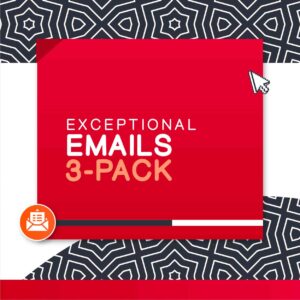
What Is Copywriting? Your Ultimate Guide for Long-term Success
What is copywriting? While the definition may vary slightly depending on who you ask, our straightforward definition is this: Copywriting is the art of having
The Product Lounge is now closed. All final orders will be delivered within 10 business days. Please see Terms and Conditions for more details.

Copywriting vs. content writing: “Is it the same thing?” is a question we’re asked often at speaking engagements and on social media. The short answer: nope, they’re not! And even though both content writing and copywriting require fundamental writing skills like researching, planning/outlining, using correct grammar, revising and editing, these two types of writing have completely different functions and outcomes.
And while they have a lot in common, it’s important not to confuse the two, especially when you want to hire a writer for your brand or business. The type of content you need and the ultimate outcome you desire will dictate which type of writer you hire to level up your content.
But as always over here at Word Stylistz, we’re going to give you the long answer, too, and break it all the way down for you. That way, by the time you reach the end of this article, you’ll fully understand the difference between copywriting vs. content writing and whether or not you need a copywriter or a content writer to complete your next project.
Let’s kick off the discussion of copywriting vs. content writing with a clear definition of content writing. This form of writing is used to educate or entertain readers. Content writing includes content like blog posts, magazine articles, and more, which we’ll discuss later on in this blog post.
Content writing takes on various forms, but it all comes down to creating content for primarily digital formats. Content writers write high-quality content that is reflective of a brand’s voice and vision, all while engaging their target audience with interesting, captivating content that makes them want to keep reading and come back for more.
The main difference between copywriting vs. content writing is the distinct underlying purposes. The purpose of content writing is to educate, entertain or build relationships. Copywriting does all of the above in addition to persuading buyers to smack the buy button®️.
A copywriter crafts text known as copy to speak to your target audience in a persuasive, benefits-focused manner to highlight how your product or service is the solution to the customer’s problem or need. This “copy” can be delivered in ads, slogans, taglines, commercials, social media posts, sales pages, product descriptions and more.
A great copywriter will boost traffic to your website and generate interest and a sense of urgency about the product or service you’re offering by leveraging SEO and speaking directly to the hearts and minds of your target audience.
A content writer, on the other hand, is more focused on educating and entertaining readers, generally using long-form content. Content writers are even more skilled at SEO as their type of writing depends on it. Content writing is a long game, but ultimately, it can still lay the groundwork for future sales.
Both copywriters and content writers are storytellers who move an audience to take action – for copywriters, that action may be to sign up, join now, or send a DM; for content writers that action may be to keep reading or, to comment below.
To summarize the main difference between copywriting vs. content writing, copy sells while content informs.
Also Read: Small Business Copywriting: How Intriguing Sales Messages Skyrocket Sales
In this ever-changing digital era that we’re all attempting to successfully navigate, it’s critical to embrace all forms of content to shine a spotlight on your brand. While content is categorized as written, visual, interactive and video, we’ll focus today on two core types of written content to further dive into our discussion on copywriting vs. content writing:
Blog posts are a vital part of the copywriting vs. content writing discussion because they top the list of valuable content pieces (with copywriting elements). Blog posts offer a long-term ability to boost website traffic, increase your influence as a thought leader, help build long-term relationships and communities and serve as a viable lead generation resource for your business.
Blog posts (like this one) are great when you want to educate your audience, boost brand awareness and build a track record of providing valuable content for your audience.
Unsure what types of blog posts to write and share on your website? Here are 11 types of blog content you can write to get started:
Actionable Tip: Think of a business-focused keyword or phrase your audience is likely searching for and plug that into a tool like Frase. It will deliver a rundown of the most popular content on that keyword topic and get your creative juices flowing on appealing topics you can write about.
There’s no conversation on copywriting vs. content writing without mention of eBooks. eBooks are powerful lead generators if you’re looking to grow your email subscriber community or increase leads for your sales team. You can offer an eBook as a free digital download in exchange for a reader sharing their e-mail address.
For example, we recently showcased a free digital eBook called the Cash Kit on a television show we were featured on and it helped us add thousands of new subscribers to our email list.
eBooks are also a great way to showcase your expertise and knowledge and guide potential customers deeper into your sales funnel.
Actionable Tip: Create an eBook on a valuable topic for your potential customers. Use an opt-in landing page to showcase the benefits of downloading the ebook in exchange for a name and email address. Once on your list, you can guide subscribers through a four to eight-part sales email sequence persuading them to invest in a paid offering.
Before scaling our suite of offerings and launching the Word Stylistz platform in 2018, we offered both content writing and copywriting services. On the content writing side, we’d craft attention-grabbing white papers, brochures, diversity and inclusion booklets, magazine articles, radio spots and press releases.
However, juggling between the two niches left our team burnt out and overwhelmed so much so that we decided to focus only on copywriting. And not ALL copywriting, but only a core group of copy. Today, instead of battling between copywriting vs. content writing, our team ONLY handles the copywriting services listed in the Product Lounge. With this new laser focus, our team has grown to become fast-writing experts in our core offerings.
Now that you know the difference between copywriting vs. content writing, the burning question is … do you need a copywriter or a content writer? Well, that goes back to your underlying goal and also, the type of content you need written.
Here are some examples of when you’ll need a copywriter:
On the other hand, you’ll need a content writer if:
Before choosing between a copywriter vs. content writer, keep in mind that copywriting vs. content writing have entirely different goals to achieve for your brand. And the writer’s quest to achieve that goal will determine what and how they craft copy or content for you, so be sure to have a firm handle on your business goals BEFORE seeking to work with a copywriter or content writer.
Before we close out the conversation on copywriting vs. content writing, we must discuss salary variances between these two disciplines. According to Salary.com, an entry level copywriter salary starts at $49,001. Alternatively, according to Glassdoor.com, the starting pay for an entry-level content writer is $40,876.
While the salaries between copywriting vs. content writing pros are in the same ballpark, copywriter positions will typically always pay slightly more because of their potential to bring in revenue.
At Word Stylistz, we employ a team of copywriters, editors and proofreaders to ensure our clients receive the service and top-quality cash-generating copy they want and deserve.
If you’re reading this, you most likely need a copywriter and the great news is, you’ve come to the right place! The Word Stylistz team delivers top-rated, budget-friendly, done-for-you copywriting services that have helped our clients generate $100 million (and counting) in revenue. Visit the Product Lounge to get all the copy you need to boost your revenue, sales and profits.

What is copywriting? While the definition may vary slightly depending on who you ask, our straightforward definition is this: Copywriting is the art of having

Finding and hiring the right copywriter for your brand is an important decision that can have a significant impact on the success of your online

The Rihanna marketing strategy and her overall Savage-Fenty campaign are two prime examples of how to create an attention-grabbing content and stamp your brand in

What’s the difference between a sales page vs. landing page? In short, landing pages are used to gather contact information, while sales pages are used



